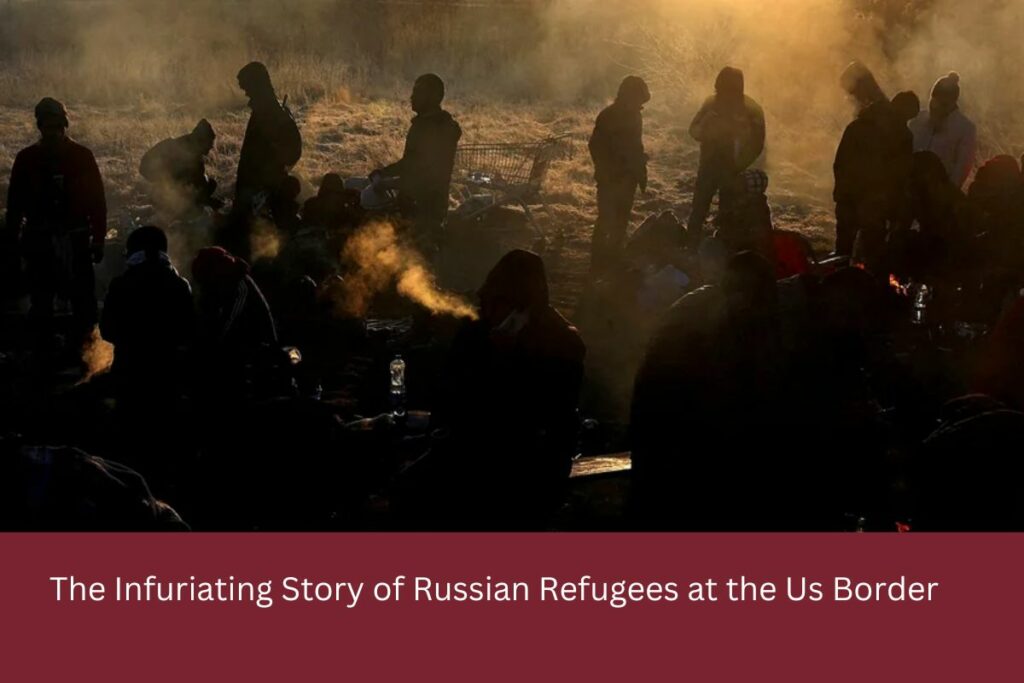The handling of asylum seekers, this time from Russia under Vladimir Putin rather than from other South American danger regions, is posing a foreign policy crisis along the southern U.S. border. The horrific specifics are detailed on the front page of the New York Times on Tuesday by Miriam Jordan.
Mariia Shemiatina and Boris Shevchuk, a married couple who both work as doctors in Russia, were threatened with arrest after expressing online criticisms of Putin’s conflict in Ukraine. They ran away to Mexico, drove to a port of entry into the United States, turned in their passports, and asked for asylum.
Instead, they were handcuffed, shackled, sent to separate immigration detention facilities, treated horribly by guards, and ordered by a judge to post a $30,000 bond as a condition of their release. They had a happy ending when a lawyer was able to decrease the bail to $10,000 and raise the necessary funds from donors, who also helped the couple find housing. The Times claims that the story is common, though.
Putin’s invasion of Ukraine in February of last year and his following repression of all detractors sparked a large-scale emigration. Over 21,000 Russians have asked for asylum in the United States this year, compared to just 467 in 2020.
You May Be Interested In:
- After Being Re-elected, What Will Newsom Do?
- Mastriano, a Trump Supporter, Has Conceded the Governorship of Pennsylvania
The majority of those seeking freedom spend months in “cold, windowless” detention facilities without access to lawyers or their personal belongings, such as laptops or smartphones containing proof of their political persecution at home. Although the guards remove them, these goods are essential to their asylum claims.
I realized that I had left Russia for a place that was just like Russia, Shevchuk told the Times. This is the savage disaster raging within the prisons managed by US Immigration and Customs Enforcement. The two doctors’ cases and several other, all-too-common examples are horrifying not just in and of themselves but also for the representation of America they give to the rest of the world.
The main goal of U.S. foreign policy, according to President Biden, is to demonstrate that American democracy is capable of solving “big problems” and improving the lives of its citizens. This view is supported by the president’s frequent portrayal of international politics as a contest between democracy and authoritarianism
. In March 2021, he stated during a press conference, “That’s what’s at risk here. “We must show that democracies are effective.” Secretary of State Antony Blinken elaborated on the idea the following day at a NATO conference, saying, “If we stand up for the free and open system that we know provides the best conditions for human ingenuity, dignity, and connection—we’re confident that we can outcompete China or anyone else on the playing field.”
Biden was discussing a major infrastructure bill that he was presenting to Congress. Blinken was attempting to reawaken the foreign ministers of the Western military alliance, whose faith and cohesion had been damaged throughout the course of Donald Trump’s first four years in office. However, a country’s appeal—and a political system’s lack thereof—can also be “demonstrated” in smaller arenas, such as how it handles asylum seekers.
Many of the approximately 1 million Russians who have fled Putin’s tyranny may one day return to their country and aid in constructing a new Russia from the ruins of the one that Putin has destroyed. If they had positive memories of their time spent in the United States, saw our political system as something to imitate (in their own way), or at the very least saw us as partners (in some areas), rather than as hostile rivals or enemies, that would be good—it would be in our national security interests.
Wordle’s new editor is destroying it. Oh No, Those Balenciaga Ads Have a Point, According to Fox News
Help! I’m not sure how to handle my friend’s habit of staring me down while we talk. The great diplomat George Kennan, who helped develop the United States Cold War “containment” strategy, observed at a celebration for his 90th birthday in 1994, “A country like ours exerts its most valuable influence beyond its borders largely by example, never by precept. We won’t be very useful unless we maintain the excellence, vitality, and morale of our own society.
When criticized for their violations of human rights back in the 1950s and the beginning of the 1960s, Moscow’s propagandists would yell, “What about the Negroes lynched in Mississippi?” in response. We shouldn’t enable Putin, Xi Jinping, or any other authoritarian leader to respond to criticism of their misdeeds by mentioning the asylum seekers detained in their immigration detention facilities.
President Dwight Eisenhower dispatched federal forces to Mississippi to enforce school integration rules after receiving information from his diplomats that racial unrest was harming American foreign relations. President Biden should fundamentally reform ICE for the same cause.

